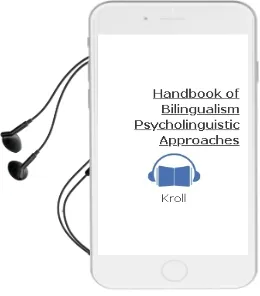Descargar AudioLibro Handbook of Bilingualism. Psycholinguistic Approaches de Kroll

Ficha completa del audiolibro
- Nombre del audiolibro: Handbook of Bilingualism. Psycholinguistic Approaches
- Autor del audiolibro: Kroll
- Fecha de publicación: 7/2/1990
- Editorial: NO DISPONIBLE
- Idioma: No Disponible
- Género o Colección: Psicología y Pedagogía
- ISBN: 9780195373653
- Valoración del audiolibro: 9.22 de un máximo de 10
- Votos: 645
- Autor(a) de la reseña: Eustasio Barrientes
- Reseña valorada con una puntuación de 8.05 de un máximo de 10
- Fecha reseña: 5/8/2018
- Duración: 7 horas con 24 minutos (304 MB)
- Fecha creación del audiolibro: 25/05/2018
- Puedes escuchar el audiolibro en estos formatos: WMA - WAV - MPEG4 - FLAC - ATRAC - MP3 (compresión LHA - ZIP - TZO - RAR - LZMA)
- Incluye un resumen PDF de 68 páginas
- Duración del resumen (audio): 51 minutos (34 MB)
- Servidores habilitados: MEGA - Google Drive - 4Shared - BitShare - SeedPeer - EliteTorrent - Uploaded
- Encuadernación del libro físico: Tapa Dura
- Descripción o resumen: About this title: Until recently, cognitive science virtually ignored the fact that most people of the world are bilingual. During the past ten years this situation has changed markedly. There is now an appreciation that learning and using more than one language is the more natural circumstance of cognition. As a result, there is a wealth of new research on second-language learning and bilingualism that provides not only crucial evidence for the universality of cognitive principles, but also an important tool for revealing constraints within the cognitive architecture. In this volume, Judith Kroll and Annette de Groot have brought together the scientists at the forefront of research on second-language learning and bilingualism to present chapters that, rather than focusing simply on their own research, provide the first comprehensive overviews of this emerging field. Bilingualism provides a lens through which each of the central questions about language and cognition can be viewed. The five sections of this book focus on different facets of those questions: How is language acquired when infants are exposed to multiple-language input from birth, and how is it acquired when adults are required to learn a second language after early childhood? How do adult bilinguals comprehend and produce words and sentences when their two languages are potentially always active and in competition with one another? What are the neural mechanisms that underlie proficient bilingualism? What are the general consequences of bilingualism for cognition and for language and thought? This handbook will be essential reading for cognitive psychologists, linguists, applied linguists, and educators who wish to better understand the cognitive basis of bilingualism and the logic of experimental and formal approaches to language science.



































































